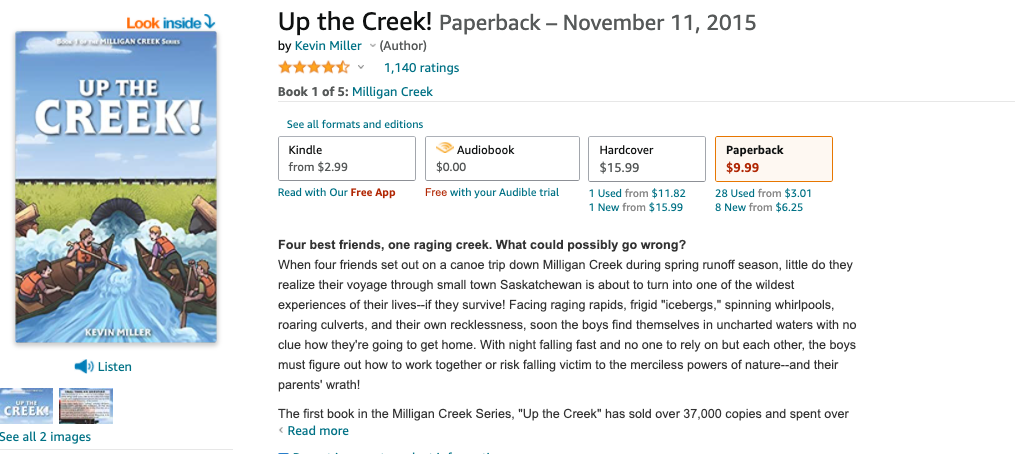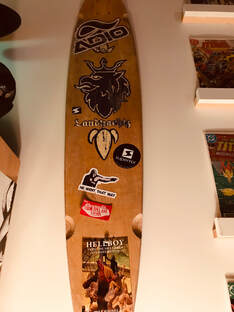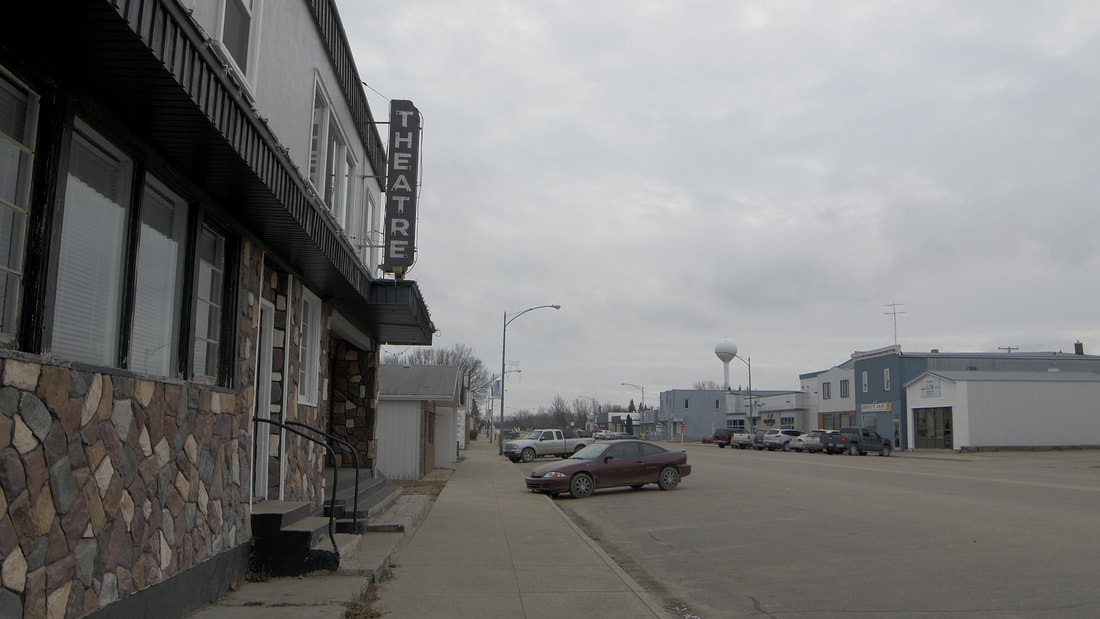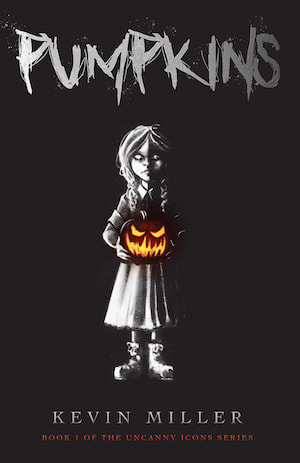 It's time for another instalment of my series of interviews with other middle-grade authors. This time it's Zander Bingham, a.k.a. Brett Swain, who writes the Jack Jones Series and other books with the assistance of his wife, Diana. Seeing as they work as a team, I invited them both to be part of this interview. Enjoy! 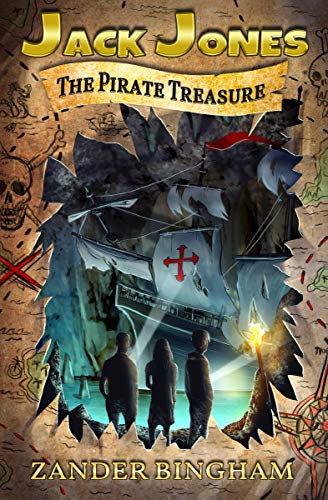 Who were some of your early inspirations as authors? Brett: My path to becoming an author, and my journey into books and reading, came about in a rather unconventional way. As a child and even a young adult, I didn’t really enjoy reading very much and often struggled to get through assigned books at school. Instead, as personal computers emerged in my “tween” years (as my kids call them), I took to them like a duck to water. I’d spend hours and hours tinkering with computer parts and learning to code in the text-based languages of the era. And I played, perhaps, too many video games. I was never interested in fighting/war games. Instead, I consumed titles produced by companies like Sierra Entertainment with great passion: Kings Quest (Roberta Williams), Police Quest (Jim Walls), Gabriel Knight (Jane Jensen), Space Quest (Mark Crowe and Scott Murphy), etc. The graphics were, at least early on, fairly simplistic, but I was drawn to the narrative-based journeys, with problem solving and exploration unfolding over weeks or even months depending on how complex the puzzles or mysteries were. These were my stories (and I still play games like these when I can). Books really entered my life in my late twenties/early thirties when I discovered the travel and adventure genre, some factual/biographical and some fantastical. Around this time, the release of the Kindle e-reader, and increasing content for it, also made books a lot more accessible and convenient for me and likely contributed to my growing interest in the written word as a source of entertainment and inspiration. Diana: I was an avid reader as a child. I would read anything I could get my hands on. I loved Eric Carle and Maurice Sendak. I devoured Ann. M. Martin’s Baby-Sitter’s Club series. I had one of those glow worm dolls where the face lit up, and at bedtime, I would pull out the little torch from inside the doll and pull the covers over my head and read late into the night. Growing up I recall being introduced to Roald Dahl books when I was around eight. After reading George’s Marvelous Medicine, I was hooked. In high school and college, I enjoyed reading John Grisham novels. How did you get started writing? Did you start by writing books or something else?Brett: I started with books. Diana and I were at a junction in life and deciding which direction to head professionally. We’d become aware of the self-publishing world, and it spoke to us as a great fit both personally and professionally. The idea to write children’s books for this age group was born from reading to our growing boys and a desire to create contemporary and relatable adventures that were wholesome and safe. We researched the space and the process that people had followed to take an idea and turn it into a book, and we figured it was worth a shot. I sat down at my laptop, opened Word, and began tapping away. For me it’s been incredibly enjoyable knowing I’ve found a practical use for my wild and immersive imagination. Writing books for a living allows me to indulge the thoughts and journeys my mind likes to conjure up rather than having to push past them to “get back to work,” and that is truly a joy. I've always been interested in the co-writing process. What does this look like for you? Brett: I have a lot of ideas for stories. Some make sense to move forward with, others not so much. I make notes on them all and then slowly build the story in my mind. Assembling the cast of characters, who they are and what motivates them, is an enjoyable part of the process too. I usually have the beginning and the end sorted out. Then I work on the middle to make sure it all makes sense and is believable and entertaining. I plan ahead as a way to get started but find the stories and characters evolve and change as I go. I write a draft and then give it to Di, who reads it and gives me feedback. We go back and forth until we feel we’ve created a great product that readers will enjoy. Diana: Oh, to be inside the mind of a writer! Brett has SO many ideas floating around and will often casually mention during meals or on walks, “I’ve got this new idea for a series . . .” I find it remarkable because I’m not the story maker, but if he’s ever stuck on how to make something seem viable or how to connect some dots in a believable way, we’ll collaborate and share thoughts until we reach an aha moment where we agree that we’ve found the path forward. Then Brett will write the story, and I’ll handle editing, proofreading, and reworking details if necessary. Then we enlist an outside editor (by that point we’re so close to the story it can be easy to overlook things), and then we publish. You've chosen to publish under a pen name. What motivated that decision? Brett: From the outset I had ideas that crossed multiple genres and audiences, so I felt that creating a pen name would ensure I could keep a space for each “world.” That way readers won’t get confused if they discover a children’s bedtime book alongside an adult contemporary fantasy fiction novel. Pen names are like tabbed files in a filing cabinet. They help to keep everything organized and compartmentalized, which is helpful to readers just as much as it is to me as the author. If I ever write a non-fiction book, I’ll probably publish it using my real name. What is the Jack Jones series about? What inspired you to write it? Brett: Jack Jones is a children’s series that follows three savvy kids who embark on various fun-filled adventures. It has a mild Goonies meets the Hardy Boys feel to it and was born from wanting to read safe but fun and engaging stories to my boys at bedtime. I wanted to keep the stories fairly realistic, so readers could picture themselves in these situations. I’ve loved having input from the boys on various elements of the books—the titles, the content, and the type of quest the characters might venture on next. It’s been fun collaborating with them about story ideas and things they’d like to see happen to the characters. What draws you to write for middle-grade readers? Do you plan to write for other audiences too? Brett: We have two boys, ages 10 and 6. They were just 7 and 3 when I launched the first Jack Jones book, so I wanted the series to be age appropriate, I wanted to spark their imaginations and share ideas for adventures that I wish I had as a kid, and I wanted to make sure they weren’t scary, so they would be suitable to read before bed. We’re very close to launching our first picture book – it’s a bedtime story about dreaming big, so it’s for much younger children, newborn to five years—so I’m excited to see that one come to fruition. I have also written two books under a different pen name in an adult contemporary fantasy series. One book is published and the other is in the editing stage. I plan to make it a trilogy. Unlike the middle-grade books, these novels are 120,000 words plus and take more time to write and produce. I’ve also got an action-adventure series buzzing around inside my head looking for a way out, kind of James Bond meets Jason Bourne but maybe a bit grittier, which would be a different audience—and pen name—again. What motivated you to publish independently rather than going the traditional route? Brett: I’ve always enjoyed working for myself, so I really like the self-publishing model. I was also fortunate to have previous experience running a business, so I was comfortable and familiar with those elements, albeit a very new and unfamiliar product. With access to resources to be able to manage all the moving parts you need to get a book to market, it was an exciting notion that drew me to want to write and publish books independently. We spoke to authors who had gone both ways with this, and one thing that resonated more than any other was a comment from an author who went the traditional route and now feels as though she is one of a thousand books at the publisher vying for attention. She has no control over production schedules, marketing, or promotion. As unknown authors, not wanting to fall into that same situation, we enjoy the fact that our books are all we work on and can give them the required attention all the time. Our publishing future is in our hands, and ultimately, it suits the company vision much better. Do you do this full time, or is writing more of a part-time gig? Brett: I have been writing full time since 2016. I wrote the first three Jack Jones stories--The Pirate Treasure, The Haunted Lighthouse, and The Lost Temple—one after the other and launched those in 2018. I also worked on a contemporary fantasy series (for a mature audience) during that time as well, with the first book launching in October 2019. Diana: It’s definitely a full-time venture. Long hours, seven days a week. I’ve heard that self-publishing is a marathon, not a sprint, but Brett and I are a team of two, so we’d like to be producing more books. Our goal in the next 3 months is to be releasing a new book each month. We’re definitely ambitious. What are some of the biggest benefits of being an independent author? Brett: The flexibility to write, produce, and launch your own books is incredibly rewarding and satisfying. From a business perspective, it’s great to have full control over each element of the publishing process. What are some of the biggest challenges? Brett: It takes a lot of hard work and discipline for sure. It’s also not always easy to “turn on the creative.” I’ve found that consistency and writing every day is the best way to keep it flowing. If I had to pick the biggest challenge, it would be finding ways to increase my output and get the ideas out of my head and down on paper faster. Second to that is working through all that my imagination dreams up, and then melding it all into marketable products. Ultimately, to be able to keep doing this as a career, selling a lot of books is necessary, so we need to make great products consistently. That means understanding and paying a lot of attention to all the components that contribute to that. Like they say, “Congratulations, you’ve written a book. Now the real work begins.” Diana: Everything is in our hands—finding our audience, getting the message out to them, and sourcing illustrators and cover designers, editors, and proofreaders. It’s all on our shoulders to make your books the best they can be and then making readers aware that the books exist. We don’t have the backing of a publishing house with a formidable team of experts to shape and guide the story, so every element is scrutinized to perfection. Having said that the indie community is incredibly supportive, and while self-published authors might be on their own when it comes to getting your books out to the world, there are some amazing resources and successful self-published authors who are happy to share their knowledge to help others, which I think is rather unique to this industry in the best possible way. What can we expect to see from you next? Brett: I’m writing two new middle-grade series right now. I’m one book into a series of adventures set in space, so millions of miles away from Jack Jones, but I think readers in the same 6-12-year-old range will enjoy some new adventures with quirky characters and some goofy cosmic fun. I’m also working through the third book in a mysterious castaways series aimed at a slightly older middle grade audience set on a deserted island, so lots of exciting new content being created. I really am loving writing these new adventures; I just need to write faster! Beyond this, once these series are moved into the production phase, I’m well into the planning of two additional series. One is a less comedic space adventure, and the other is a mystery/detective series. So many ideas swirling around! Diana: We’re wrapping up illustrations on the seventh Jack Jones adventure, and we have the final draft of book eight almost completed as well. Then we plan to produce a boxed set for the holidays with the complete Jack Jones collection. It is exciting to see the series come full circle after three years of producing these classic adventures. Edits have begun on book two in the contemporary fantasy series, so we are hoping to be able to launch that in early 2022. To learn more about the Swains and their books, visit their official website.
0 Comments
I'm super excited to announce that Up the Creek is now available as an audiobook on Audible and Amazon and soon to be available on iTunes. If you already have an Audible account, you can listen to it for free. Otherwise, you can purchase it for the seemingly arbitrary price of $13.08 (Audible sets the price, not me). Anyway, Tanner De Bruyne did an excellent job of narrating it, and he's already working on Unlimited, which will be made available on audio this summer, followed by The Water War. You can listen to the first chapter for free below.
When I knocked off for today, I was about six words shy of 27,000 words into the first draft of Quiet On Set!, book six in the Milligan Creek Series. And that's after finishing Pumpkins earlier this month. Feeling pretty accomplished, but there's still a ways to go yet!
Growing up on a farm in Saskatchewan, I thought skateboarding was the coolest thing ever, but there was literally nowhere to do it where I lived, and there was no skateboard culture anywhere near me. Then, at age 40, I bought a rental house that happened to come with a really good skateboard that the previous owners inexplicably left behind. I took it as a sign from the universe that it was finally time to "hit the deck," so to speak. Dozens of skinned knees and elbows and one broken thumb later, I became pretty good at riding the bowl, my favorite aspect of skateboarding. Then at a garage sale I came across a cool vintage Landyachtz longboard (which is now mounted on the wall of my home office, image below). Once again, I took it as a sign to take my boarding career in a different direction. We happened to be living in a community with lots of paved trails on hills, and our town even has an annual longboarding competition, so it seemed perfect. The first time I took out the board, I started too high on the hill and had to bail out on a tight corner because I was going too fast. The result was a sprained ankle, a cracked rib, and pretty severe road rash on both elbows (scars I still bear to this day). Believe it or not, while still in shock, I took the board back up the hill (starting a little lower this time), and did it again. This time I made the corner. Then I limped home through the forest, leaving a blood trail behind me that, thankfully, no wild animal chose to follow. I've since upgraded my board to a Landyachtz Hollowtech board, similar to the one below, a technology designed right here in Kimberley, BC, where I live. After miles and miles of boarding (mostly in the golf course next door during the off season), I've only sustained one sprained ankle.
What is the point of all this, you ask? While doing research for my new Milligan Creek novel, Quiet on Set!, which involves a film shoot about a guy named Wind Wagon Smith, I came across an article on Wikipedia about, you guessed it, land yachts. Turns out land sailing has been a thing since about AD 552! And here I thought Landyachtz the company was doing something new. That's one of the coolest things about writing. You never know what you'll have to learn next and how it might connect to something you already know--and love. Chapters are starting to roll in, narrated by Tanner De Bruyne. Excited to hear the finished product, soon to be available on Audible and Apple Books. In the meantime, here's the first chapter.
Growing up in small-town Saskatchewan in the 1980s, the local movie theater was a vital connection to the outside world, especially in the pre-VCR and pre-satellite TV era, which I remember all too well. I grew up on a farm, so I didn't even have cable. Just two channels we got over the air. So, it was always exciting when we had a chance to go to "the show" at 8:00 p.m. on Friday or Saturday night. Even though movies tended to arrive in Foam Lake months after they were released in the broader world, it was our only real opportunity to see Hollywood's latest offerings.
The first movie I recall seeing at our theater was during the annual Santa Claus matinee. I don't remember the title. All I know is that it was a black-and-white film that took place in the military and involved a donkey (it could have been this film). It was more of a social event than a movie-watching experience though. We were mainly there for when Santa showed up at the end to hand out treat bags, which contained candy, peanuts in the shell, and a mandarin orange, which was a rarity for me back then. One of my most vivid memories from that era was seeing The Empire Strikes Back. At nine years old, I stood in the doorway of my sister's bedroom as we were about to leave for the theater, trying to help her understand what a momentous occasion it was. She just laughed at how serious I was about it. A few years later, I went on my first date to see Return of the Jedi, but I was too afraid to hold my girlfriend's hand. (She stopped being my girlfriend about a month after that. I guess I literally let her slip through my fingers.) I also recall my dad taking us to see Airplane. We were far too young to see that film when we did, but I think Mom had told him to get us all out of the house, so she could have the night off. Hangar 18, a movie about a UFO cover-up, also stands out, as does being told to quiet down while watching Footloose. Then there was lining up to see Tim Burton's Batman. The line extended down the street, which was rare for any movie. A huge comic book collector at that point, I was right there for the first screening on Friday night in my Batman T-shirt with the classic yellow-and-black logo. I often wonder what my life would be like today if Foam Lake didn't have a movie theater. Would I have gone off and gotten involved in the film business myself? I also chuckle when I think of some of the movies I saw at that theater, wondering if the filmmakers ever dreamed their movies would resonate with a starry-eyed, pimple-faced teenager who lived on a farm outside a tiny town in the prairies dreaming of the day he might make it to Tinseltown. I know one thing that would be different if we didn't have a movie theater growing up: the Milligan Creek Series. I'm having so much fun writing this sixth book, Quiet on Set!, which is a love letter to movies, the movie industry, movie theaters, and small-town life. I hope I can do justice to all four of those influences. The movie theater in Foam Lake is still operating, after a fashion. No longer showing first-run films, it screens movies on Blu-ray and is available for private events. I got a chance to peek inside it a few years ago right before it was renovated. Not much had changed, thankfully. I'm just glad the people in the community decided to save it rather than let it drift into decay, as happens to so many old buildings on the prairies. Here are a couple of photos that show how the theater looks today. As I said, not much about it has changed. So, when you read about the theater in my new book, picture this place. My big plan was to take April 15 to May 15 off my other work (editing other people's books) to see if I could bang out the first draft of Quiet On Set, book 6 in the Milligan Creek Series. Unfortunately, my editing work dragged on until April 26. Then I had some finishing up to do on Pumpkins, book 1 in the Uncanny Icons Series. So, by the time I finally settled down to work on the new Milligan Creek book, I was almost two weeks into my planned month off. However, since then I've made good progress, and I'm nearly 20,000 words into the book. After the seriousness of Pumpkins, it's fun to be back in a world where each character is zanier than the next. It's also fun to be writing about moviemaking, which is my "other" other career. In addition, I managed to extend my "time off" until May 20. At this point, there's no way I'll be able to complete the draft, but I should be well over half finished, which will put me in good shape to release the novel this fall.
Pumpkins, book 1 in the Uncanny Icons Series, is now available in paperback and hardcover. You can also preorder the ebook at a discount, with the ebook releasing on June 28. I'm calling this a "light horror" series because it's spooky but not gory. Ideal for anyone ages 12-65+. Here's a brief synopsis. If they wouldn’t have planted those pumpkins, especially in that spot, maybe none of this would have happened . . . And here's a peek at the cover.
Truth is stranger than fiction. My new Milligan Creek novel, Quiet on Set, features a washed-up action movie star who made a bit of money endorsing products in Japanese. The commercials were never supposed to air in North America, but somehow word got out. I was going to make up a strange product for him to endorse, but when I was doing some research in that regard, I stumbled across this thing and realized I couldn't come up with anything stranger than this. So, I merely gave it a new name. |
Kevin MillerBrief thoughts and updates on writing, publishing, and life Archives
June 2024
Categories
All
|
 RSS Feed
RSS Feed
